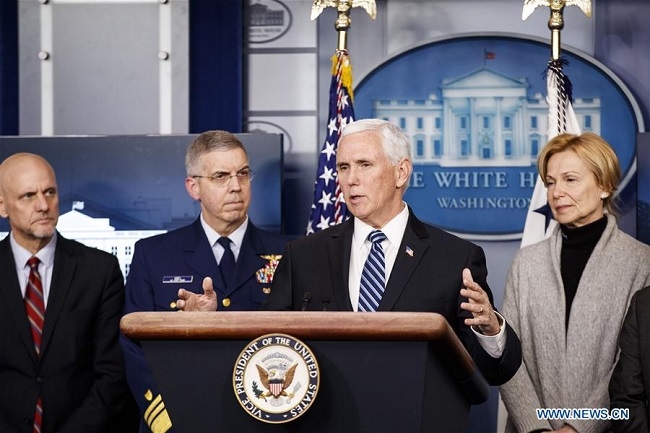



US Vice President Mike Pence (front) along with members of the Coronavirus Task Force attend a press conference at the White House in Washington D.C., the United States, March 6, 2020. Mike Pence said Friday that 21 people on the Grand Princess cruise ship have tested positive for COVID-19, including 19 crew members and two passengers. (Photo: Xinhua)
The US Senate overwhelmingly passed the funding package on Thursday (March 5), following a similar bipartisan approval by the House of Representatives a day earlier.
The bill, negotiated by leaders from both Senate and House appropriations panels, will boost funding for the testing of the virus, support the development of vaccines, as well as lower costs for medical treatments.
The plan includes nearly US$7.8 billion in new funding to combat the spread of the virus at the local, state, national and international levels, and it also authorizes US$500 million to allow Medicare beneficiaries to access telehealth programs.
The funding package was signed into law as fears of virus spreading are growing among Americans, with over 300 confirmed cases and over 10 deaths reported in the United States as of Friday, according to data tracking tool developed by the Johns Hopkins University.
The funding plan is significantly larger than the request from the White House, which initially asked for US$2.5 billion to fight the ongoing spread of the disease.
In a tweet Thursday, Senate Minority Leader Chuck Schumer, a New York Democrat, called the Trump administration's proposal "dangerously inadequate," noting that the House and Senate have come together in a bipartisan way "on an important first step" to deal with this crisis.
Senator Richard Shelby, chairman of the Senate Appropriations Committee, said in a statement Thursday that the US$8.3-billion funding packing "includes what our experts say they need."
"It attacks the crisis at the local, state, federal, and international levels," said Shelby, an Alabama Republican. "And it brings to bear the full resources of the federal government."
Source: Xinhua